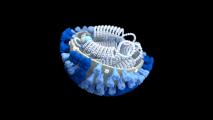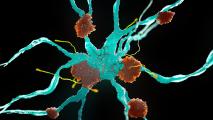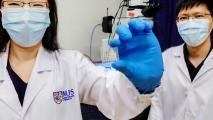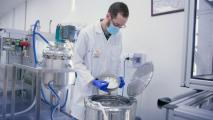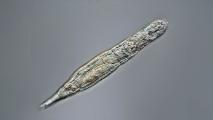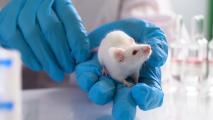
Biotech
Human history has been all but defined by death and disease, plague and pandemic. Advancements in 20th century medicine changed all of that. Now advancements in 21st century medicine promise to go even further. Could we bring about an end to disease? Reverse aging? Give hearing to the deaf and sight to the blind? The answer may be yes. And soon.
More
Did the flu lose diversity during the pandemic?
After a record-low flu season, an entire clade of flu may be gone. If so, making vaccines may have become easier.
Hope and controversy: FDA approves first new Alzheimer's drug in decades
The FDA has approved the first new Alzheimer’s drug in decades, but the decision brings not only hope, but controversy.
Blood test can quickly tell if a targeted cancer therapy works
The ExoSCOPE blood test can determine with 95% accuracy whether a targeted cancer therapy is working within 24 hours of administration.
Want strong teeth? Eat this candy.
Researchers claim to have invented an experimental breath mint that may renew tooth enamel and strengthen teeth, and it’s already headed into human trials.
Series|
Just Might Work
Can we hack sugar to be healthy?
Is there such a thing as healthy sugar? Food scientists in Israel are hacking the sugar molecule itself – eliminating the need for subpar alternatives.
Disease-resistant banana created with CRISPR
African scientists have used CRISPR to create a disease-resistant banana that is indistinguishable from unmodified plants.
Microscopic animals revived after 24,000 years in permafrost
A multicellular animal called the bdelloid rotifer has used cryptobiosis to survive in the Siberian permafrost for at least 24,000 years.
Moderna COVID-19 vaccine 2.0: Lower dose, fewer side effects
Any revised version of the Moderna COVID-19 vaccine will likely include a smaller dose, reducing side effects and increasing the supply of shots.
Editing one gene extends mouse life expectancy by 23%
By modifying just one gene, researchers were able to extend the life expectancy of mice by 23%, and they think their results may translate to humans.
Can a dog vaccine for Valley fever lead to a human one?
Cases of Valley fever, a fungal infection, have risen dramatically over the decade. Researchers hope a dog vaccine may lead to one for humans.
A small dose of an ibogaine-like drug cures stress in mice
A novel drug designed like ibogaine but without the ibogaine trip or toxicity has corrected the effects of stress in mice.
What happens when your brain imagines the future?
Research out of the University of Pennsylvania suggests imagining the future is a two-brain region job.
Mass vaccination experiment was a huge success in Brazil
A mass vaccination experiment in Brazil suggests that even a moderately effective vaccine can have a dramatic effect if enough people get the shot.
"Light-shrinking" material cranks normal microscopes up to 11
Researchers have developed a light-shrinking slide coating that allows light microscopes to image in “super-resolution.”
Inhaled nanobodies treat COVID-19 in hamsters
An inhaled nanobody treatment for COVID-19 has shown promise in animal tests and could be a more affordable alternative to monoclonal antibody drugs.
The entire human genome has (finally) been sequenced
Researchers have finally sequenced the complete human genome, filling the gaps in the Human Genome Project’s historic first draft.
Robot paramedics are bringing mechanical CPR to the UK
An English ambulance service has begun using robot paramedics to deliver mechanical CPR to patients.
Dengue fever vaccine still protects after three years
A dengue fever vaccine candidate by Takeda is still effective after three years in a large human study, raising hopes for fighting the virus.
New lab-grown mini hearts have a human-like beat
Researchers created the first human mini heart in the lab. The mini hearts, called cardioids, have developed distinctly beating chambers, which fire in sync.
Are we really addicted to technology?
Simplifying very complex things can lead to real harm.
Get inspired with the most innovative stories shaping the world around us.













